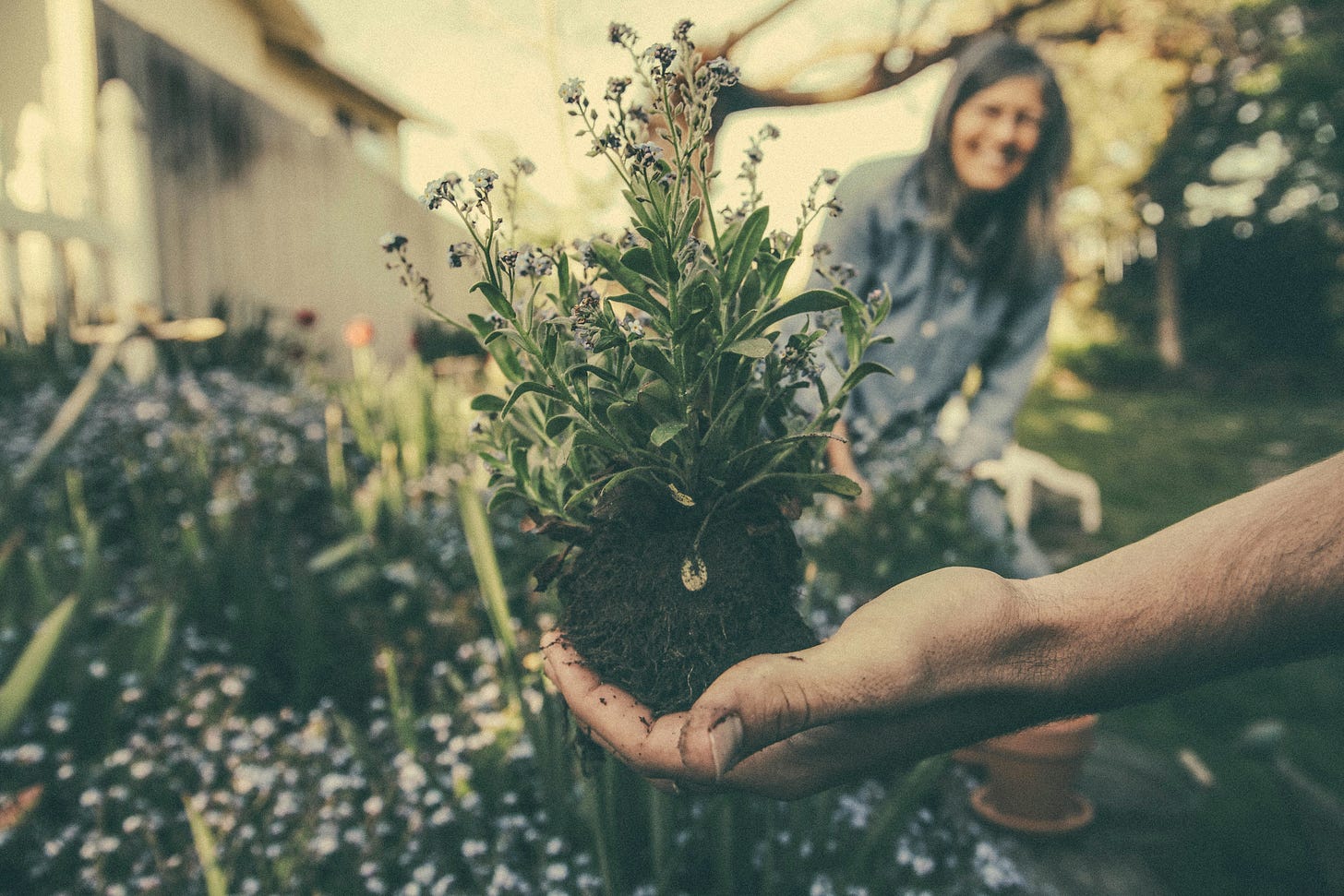This One Practice Can Help You Boost Your Discipline
If you are not doing it already you should give it a try!

Over the past few articles, I’ve explored attitudes and mindsets that help us cultivate discipline — whether by adopting new perspectives or learning how to navigate challenges effectively.
Today, I’d like to shift gears and talk about practical discipline.
While much of what I’ve shared has been theoretical, rooted in lessons from my own journey, I recognize it can sometimes feel abstract. This article marks my first step toward bridging that gap, focusing on tangible practices that build discipline in everyday life.
To start, I want to share my personal experience with gardening and how it’s become a cornerstone for developing stronger discipline. It’s a practice that goes beyond nurturing plants — it nurtures habits, patience, and personal growth. Let’s dive in.
My Gardening Journey
It all began in 2021, when my beloved soul dog, Kobe, a handsome and incredibly smart cream Shiba Inu, tragically passed away.
My wife and I were heartbroken. Kobe wasn’t just a pet; he was the heart of our home, filling it with energy and joy. His absence created a profound silence and left us with a deep sense of loss.
Amid our grief, two of our cousins, one of whom had also recently lost their dog, sent us a beautiful gesture to honor Kobe: a peace lily and an orchid. These thoughtful gifts became the cornerstone of my gardening journey.
Before this, I had always relied on artificial plants in my apartment. I believed I didn’t have the time (or discipline) to care for real ones. And when I did try, the plants wouldn’t last long—either because I didn’t know how to care for them properly or because I wasn’t consistent. Artificial plants offered the illusion of vibrancy for a while, but eventually, they began to feel inauthentic, like they didn’t truly represent me.
However, these two living plants were different. They weren’t just decorations; they were a daily reminder of how much we loved Kobe. Their presence gave our space a renewed sense of life and authenticity. This connection inspired me to learn more about gardening.
Why Gardening?
Gardening offers many immediate, tangible benefits:
Enhances your home’s interior or backyard aesthetic.
Promotes self-sustainability if you grow vegetables or fruits.
Improves air quality and oxygenation in your living space.
I experienced these benefits almost immediately. My wife even gifted me an AeroGarden (paid link) for my birthday, which allowed me to grow herbs and experiment more in the kitchen.
But as I delved deeper into self-reflection, Stoicism, and my pursuit of self-discipline, I realized that gardening offers even greater, less tangible rewards. It’s not just about growing plants—it’s about growing yourself.
Gardening and Mental Health
Numerous studies highlight the profound mental health benefits of gardening:
Gardening may reduce dementia risk by up to 36%, according to the Medical Journal of Australia1.
Just 30 minutes of gardening has been shown to lower stress more effectively than indoor reading2.
It reduces cortisol levels, helping the body recover from stress3.
These benefits resonate deeply with my own experience. Gardening became a source of solace and clarity, helping me navigate difficult times with a renewed sense of purpose.
Gardening as a Tool for Discipline
Beyond its mental health benefits, gardening taught me something even more profound: discipline. It’s not just about tending to plants—it’s about transforming how we approach life.
A Two-Way Relationship Between Gardening and Discipline
Think about the last time you committed to a habit, like working out, journaling, or meditating. It probably required effort and discipline to maintain. Gardening is no different—it demands consistent care. But here’s the magic: while gardening requires discipline, it also helps build it.
As James Clear writes in Atomic Habits (paid link):
“Every action you take is a vote for the type of person you wish to become.”
When you nurture your garden daily, you’re not just caring for plants. You’re voting to become someone who is consistent, patient, and intentional.
This reciprocal relationship shifted my perspective on gardening and personal growth. Here’s how it works.
Gardening Demands Discipline
Plants don’t thrive on neglect. They need regular watering, weeding, and care. Skip a few days, and you’ll see the consequences. Nature doesn’t wait for you to feel motivated—it requires consistent effort. Charles Duhigg explains it in The Power of Habit (paid link):
“Habits emerge because the brain is constantly looking for ways to save effort. Once a habit is formed, it reduces cognitive load.”
Gardening helps transform discipline into a habit, making consistent care feel less like a chore and more like second nature.
Gardening Teaches Patience
Unlike many modern activities that offer instant gratification, gardening operates on nature’s timeline. You can’t rush a tomato to ripen or force a flower to bloom. This teaches patience and long-term thinking.
This mirrors a mindset I’ve shared in previous articles: Shoot the Arrow. Focus on the process, not just the outcome.
The Compounding Effect
What makes gardening truly transformative is how its benefits compound over time.
As your disciplined approach helps your garden flourish, the visible results reinforce your commitment. At the same time, the patience and consistency you develop begin to influence other areas of your life—your work, relationships, and personal goals.
I call this the “gardener’s paradox”: by submitting to the discipline required for gardening, you strengthen your overall capacity for discipline. It’s a cycle where effort and reward continually reinforce each other.
Where to start
If you’re new to gardening, starting small ensures you don’t get overwhelmed. Here’s a simple plan:
Start with One Indoor Plant: Choose a plant that’s easy to care for, like a peace lily or snake plant. Use apps like Planta to establish a routine and track its care needs.
Expand Your Indoor Garden: Once you’re comfortable with one plant, add a couple more. Challenge yourself with plants that require slightly more attention, like an orchid or pothos.
Try Container Gardening Outdoors: Explore small-scale outdoor gardening with pots or containers. Start with easy-to-grow vegetables or herbs that thrive year-round.
Transition to Outdoor Gardening: Expand to larger garden beds or community gardens. This step connects you more deeply to nature and broadens your gardening skills.
Takeaways
Gardening is more than a hobby — it’s a journey of self-discipline and growth. It teaches us patience, resilience, and the value of consistent effort.
The relationship between gardening and discipline is beautifully reciprocal. Gardening demands discipline to succeed, but it also cultivates discipline within us, creating a virtuous cycle of growth.
If you’re interested in starting your gardening journey, begin small. Progressively challenge yourself to step outside your comfort zone while developing your skills and consistency along the way.
Gardening isn’t just about nurturing plants — it’s about nurturing yourself. So, grab a plant, roll up your sleeves, and start growing.
Have a great week!
Affiliate Disclosure
At Self-Disciplined, we believe in transparency and honesty. Some of the links on this website are affiliate links, meaning that if you click on one of them and make a purchase, I may earn a small commission at no extra cost to you. These commissions help support the work put into this site and keep it running. Rest assured, I only recommend products or services that I genuinely believe in and that I think would bring value to my readers.
Thank you for your support!
Simons, L. A., et al. (2006). "Lifestyle factors and risk of dementia: Dubbo Study of the elderly." Medical Journal of Australia, 184(2), 68-70.
Thompson, R. (2018). "Gardening for health: A regular dose of gardening." Clinical Medicine, 18(3), 201-205.
Van Den Berg, A., & Custers, M. (2011). Gardening promotes neuroendocrine and affective restoration from stress. Journal of Health Psychology, 16(1), 3-11.



